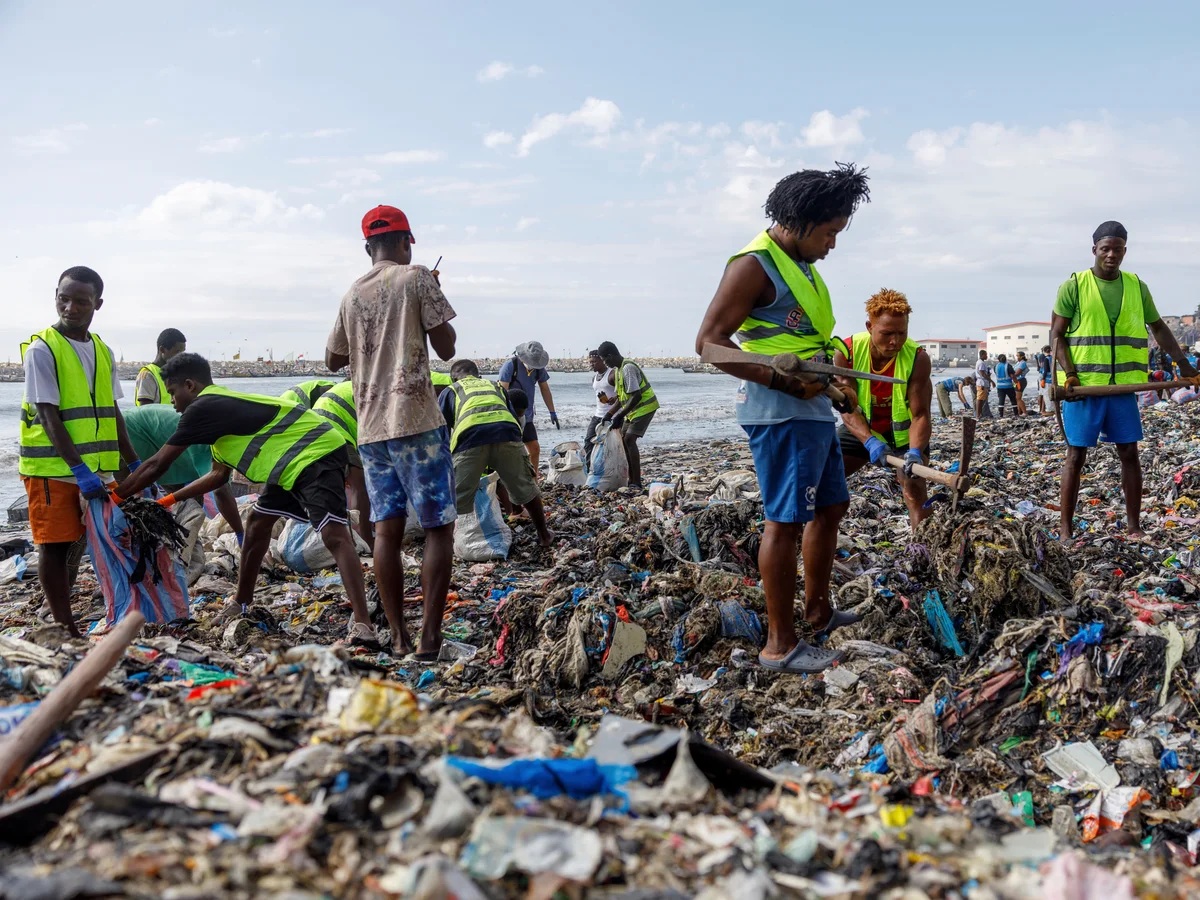UK Fast Fashion Waste Found Dumped in Ghana’s Protected Wetlands, Investigation Reveals
An investigation has uncovered that used clothing discarded by UK consumers is ending up in massive waste dumps within protected wetlands in Ghana.
According to The Guardian of Wednesday, June 18, 2025, the inquiry was carried out by Unearthed in collaboration with Greenpeace Africa.
It found items from major British retailers, such as Next, George at Asda, and Marks & Spencer, discarded in these environmentally sensitive areas.
These dumping sites are located in internationally protected wetlands that are home to endangered wildlife, including three species of sea turtles.
Local communities have expressed growing concern, saying that synthetic fast fashion waste, largely imported from the UK and Europe, is choking fishing nets, polluting waterways, and washing up on beaches.
In one dump situated near a river that flows into the conservation area, reporters found clothing from M&S, Zara, H&M, and Primark.
Fashion brands acknowledged the difficulty in managing textile waste, noting that the industry faces significant challenges.
M&S, George, and Primark mentioned their take-back schemes aimed at reducing waste.
In addition, H&M, Zara, and George expressed support for extended producer responsibility (EPR) frameworks that would hold fashion companies accountable for the life cycle of their products.
Ghana’s capital, Accra, has been overwhelmed by an influx of low-quality secondhand clothing, carpeting its beaches and clogging canals.
The investigation revealed that new dumping grounds are emerging even in conservation areas critical to biodiversity.
In one resort town, clothing waste is regularly burned due to the volume of textiles washing ashore.
Reporters also found clothing waste entangled in vegetation, half-buried in sand, and polluting nearby water systems.
At the center of Ghana’s secondhand clothing trade is Kantamanto Market, one of the largest of its kind globally.
Each week, it receives over 1,000 tonnes of used clothing. However, traders say the quality of imported clothing has deteriorated.
“The clothes we get now are mostly unusable,” said trader Mercy Asantewa.
“They’re poorly made and often damaged before we even open the bales.”
Accra has only one fully engineered landfill site, with another under construction.
According to Solomon Noi, head of the city’s waste management department, Kantamanto produces about 100 tonnes of textile waste daily.
Of that, the city can only process around 30 tonnes.
“The remaining 70 tonnes end up in wetlands, rivers, drains, lagoons, and the ocean,” he explained.
In the UK, about 1.5 million tonnes of textiles are discarded annually.
Roughly 730,000 tonnes are either incinerated or sent to landfills, while 650,000 tonnes are marked for reuse or recycling.
However, more than 420,000 tonnes of that amount—around two-thirds—are exported, with Ghana receiving the largest share.
In 2023, a delegation of Ghanaian traders traveled to Brussels to call on the EU to adopt EPR legislation.
It reportedly pressed for brands to be held accountable for the environmental impacts of their products.
The UK’s Textile Recyclers Association has also urged the British government to consider such measures.
Ghana’s Densu Delta is home to endangered leatherback and green turtles and supports rare migratory birds like the roseate tern and curlew sandpiper.
It is part of the Ramsar Convention’s internationally recognized wetland network.
Reporters from Unearthed discovered three dump sites within or near this protected area, with no apparent pollution control measures in place.
Drone footage showed one of the newer sites, Akkaway, with waste piles sitting directly on unlined ground, adjacent to streams and lagoons.
Local officials from the Weija Gbawe municipal assembly, which oversees the Akkaway site, claimed responsibility for monitoring the dump.
However, its location within protected wetlands appears to contravene Ghana’s environmental and landfill regulations and breaches obligations under the Ramsar Convention.
The assembly did not respond to requests for comment.
Residents depending on the wetlands say pollution is already affecting their lives. Seth Tetteh, a local fisherman, noted that fishing has become difficult.
“We pull up fish mixed with clothes,” he said.
“The river used to be drinkable, but now the water looks black.”
Nearby villagers say the once wild area is now overrun with waste and pollution.
“We used to see wild animals—birds, alligators, even rabbits,” said 19-year-old student Ibrahim Sadiq.
“Now it smells bad and there are so many mosquitoes, especially when it rains.”
Retailers have responded with varying levels of commitment. M&S highlighted its repair and recycling programs in partnership with Oxfam and Sojo.
George at Asda pointed to its zero-waste policy and over 800 textile recycling points.
Primark stressed that it does not authorize unsold stock or customer returns to be sent to Africa.
H&M acknowledged the lack of end-of-life recycling options as a challenge and committed to improving solutions.
Zara’s parent company, Inditex, said it supports EPR legislation and is developing technologies to enable textile recycling at scale.







